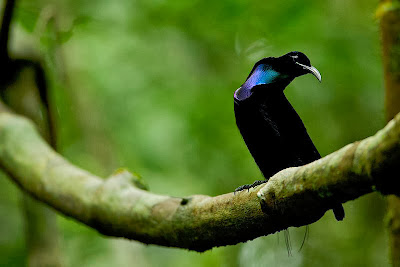 |
| Male Ptiloris Magnificus |
The Magnificent Riflebird is a medium sized, a perching bird of the Paradisaeidae family. This species used to be placed
in its own genus, Craspedophora Gray, 1840, which is now a subgenus of Ptiloris. Ptiloris magnificus is the scietific
name of Magnificent Riflebird, Ptiloris is Greek word which means feathered
nose and Magnificus is a Latin word that means magnificent, splendid. Its
common name Magnificent Riflebird nominally based on ornated likeness
of
embellishment of plumage to uniforms of British riflemen. |
| Male Ptiloris Magnificus |
The adult male magnificent riflebird is
approximately 34 cm in length, while adult female is about 28 cm long. The adult
male is black bird of paradise with a metallic blue green iridescent
crown and breast shield patterned by acute line from throat, expanded to chest.
It has a black curved beak,
yellow mouth, blackish feet and a dark brown iris.
The female is brown on head with off-white eye stripe and underparts, dark
spots and buff bars below.
 |
| Ptiloris Magnificus Mating Rituals |
Behaviour:
The Magnificent
Riflebird is sexually dimorphic. Males are polygamous and perform individual courtship
displays on traditional dancing perch. The male fully expands his wings and
raises his tail and rocking side to side and up and down, exhibiting his
metallic blue green breast shield. Various females look carefully these demonstrations,
and response the male with copulations if convinced with the execution. Later
on females build nests, hatch and look after the young without male support. They
feed mostly on fruits and insects.
 |
| Male Ptiloris Magnificus Dancing |
Breeding & Range:
The breeding season
of Magnificent Riflebird is between June to February relatively thorughout its
range. They are known to hybridise with Superb, Twelve-wired and Lesser Biirds
of Paradise. The Magnificent Riflebird is endemic and broadly spread throughout
lowland, hill and mid mountain forests, forest edges including the lowland
rainforests of New Guinea and Northern Cape York Peninsula.
No comments:
Post a Comment